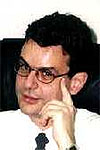In this euphemistic Bedlam, Louis Althusser would have felt at home.
With the exception of Nietzsche, no other madman has contributed so much to human sanity as has Louis Althusser. He is mentioned twice in the Encyclopaedia Britannica merely as a teacher. Yet for two important decades (the 1960s and the 1970s), Althusser was at the eye of all the important cultural storms. He fathered quite a few of them.
Althusser observed that society consists of practices: economic, political and ideological. He defines a practice as:
The economic practice (the historically specific mode of production, currently capitalism) transforms raw materials to finished products deploying human labour and other means of production in interactive webs. The political practice does the same using social relations as raw materials.
Finally, ideology is the transformation of the way that a subject relates to his real-life conditions of existence. The very being and reproduction of the social base (not merely its expression) is dependent upon a social superstructure. The superstructure is "relatively autonomous" and ideology has a central part in it.
America's social superstructure, for instance, is highly ideological. The elite regards itself as the global guardian and defender of liberal-democratic and capitalistic values (labeled "good") against alternative moral and thought systems (labeled "evil"). This self-assigned mission is suffused with belligerent religiosity in confluence with malignant forms of individualism (mutated to narcissism) and progress (turned materialism).
Althusser's conception of ideology is especially applicable to America's demonisation of Saddam Hussein (admittedly, not a tough job) and its subsequent attempt to justify violence as the only efficacious form of exorcism.
People relate to the conditions of existence through the practice of ideology. It smoothes over contradictions and offers false (though seemingly true) solutions to real problems. Thus, ideology has a realistic attribute - and a dimension of representations (myths, concepts, ideas, images). There is harsh, conflicting reality - and the way that we represent it both to ourselves and to others.
"This applies to both dominant and subordinate groups and classes; ideologies do not just convince oppressed groups and classes that all is well (more or less) with the world, they also reassure dominant groups and classes that what others might call exploitation and oppression is in fact something quite different: the operations and processes of universal necessity"
(Guide to Modern Literary and Cultural Theorists, ed. Stuart Sim, Prentice-Hall, 1995, p. 10)
To achieve the above, ideology must not be seen to err or, worse, remain speechless. It, therefore, confronts and poses (to itself) only questions it can answer. This way, it is confined to a fabulous, fantastic, contradiction-free domain. It ignores other types of queries altogether. It is a closed, solipsistic, autistic, self-consistent, and intolerant thought system. Hence the United States' adamant refusal to countenance any alternative points of view or solutions to the Iraqi crisis.
Althusser introduced the concept of "The Problematic":
"The objective internal reference ... the system of questions commanding the answers given."
The Problematic determines which issues, questions and answers are part of the narrative - and which are overlooked. It is a structure of theory (ideology), a framework and the repertoire of discourses which - ultimately - yield a text or a practice. All the rest is excluded.
(Note: You can view every article as one long page if you sign up as an Advocate Member, or higher).




